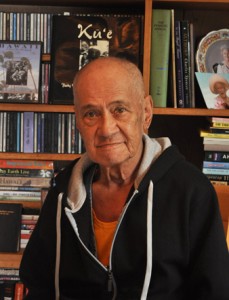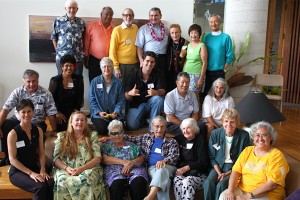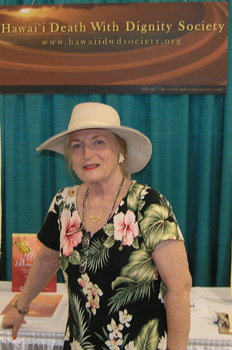By Dan Nakaso
Dr. Robert “Nate” Nathanson is ready to prescribe a fatal dose of barbiturates to help any terminally ill patient in Hawaii die.
First he has to find the right person.
“If there is somebody out there that wants to avail themselves to this and they ask their own doctor to write a prescription and the doctor is not willing to do that, then I would be,” Nathanson said. “I realize I could be prosecuted for this and I’m willing to take that chance.”
Bills are once again likely to be introduced next legislative session that would make Hawaii the fourth state in the country to allow so-called physician-assisted suicides, following Oregon, Washington and Montana.
But Nathanson and his supporters at the Hawaii Death With Dignity Society insist that he does not need a new state law to legally prescribe lethal doses of medication to terminally ill patients who want to kill themselves.
An obscure 1909 law intended to ease the suffering of Hansen’s disease patients already makes physician-assisted suicides legal in the islands, said Kathryn Tucker, director of legal affairs for Colorado-based Compassion & Choices. She added that a “constellation” of other Hawaii laws “reflect the policy of the state to vest its citizens with broad autonomy over medical decision-making.”
Nathanson, 77, of Mokuleia, retired from practicing medicine in 1998 after a 37-year career with Kaiser Permanente Hawaii, working in Kaiser’s clinics in Kailua and Kaneohe.
But he’s kept his medical license over the past 13 years, hoping to ease the suffering of terminally ill patients.
Nathanson helped found Hospice Hawaii more than 30 years ago and treated dying patients every year.
“They would ask me, ‘Doc, can you help me end this? I’m miserable,'” Nathanson said.
Before he was referred to the 1909 law, Nathanson said he thought that physician-assisted suicide — or “death with dignity” in Hawaii — “was illegal and I risked losing my license and possibly going to jail.”
Joshua Wisch, spokesman for the state Attorney General’s Office, declined to comment on whether the 1909 law makes physician-assisted suicides legal in 21st-century Hawaii.
“Our department doesn’t have a position on that at this time,” Wisch said.
A law passed before Hawaii became a state in 1959 generally remains valid today, said Randy Roth, a University of Hawaii law professor.
“Unless the Legislature has enacted something that changed it or a court has made some sort of decision that affected, it would presumably be viable today,” Roth said.
Jim Pietsch, director of UH’s Elder Law Program, came across the 1909 law in 2004 while writing an article about end-of-life decisions for the Journal of Legal Medicine.
Hawaii Revised Statutes 453-1 addresses the “practice of medicine” and says, in part:
“(W)hen a duly licensed physician or osteopathic physician pronounces a person affected with any disease hopeless and beyond recovery and gives a written certificate to that effect to the person affected or the person’s attendant, nothing herein shall forbid any person from giving or furnishing any remedial agent or measure when so requested by or on behalf of the affected person.”
Pietsch said the law was written at a time when there was no known cure for Hansen’s disease, or leprosy, and other diseases such as tuberculosis and typhoid that caused “great suffering” and were often fatal.
But he said he would not recommend that any modern-day doctor solely use the 1909 law to prescribe fatal doses of medication to terminally ill patients in Hawaii.
“I would not hang my hat on one statute alone,” said Pietsch, who was a member of former Gov. Ben Cayetano’s 1998 blue ribbon panel that studied the issue of physician-assisted suicides in Hawaii. “A constellation of other statutes are also implicated. For example, one may wish to seek clarification of the provision of the penal code that says there is a prohibition against causing another individual to commit suicide. This issue is more complicated than just one statute.”
Tucker, of Compassion & Choices, said, “The 1909 law is just one piece of the picture.”
Hawaii laws already allow patients to make advanced health care directives, give them a “pain patient bill of rights” and guarantee a constitutional right to “bodily autonomy.”
“Plus you have the fact that there is no prohibition on aid in dying,” Tucker said.
Hawaii’s manslaughter laws make it a crime “to cause someone to cause a suicide,” Tucker said. “If a physician wrote that patient a prescription, it would be a huge stretch to say that the doctor was causing anything. In Hawaii, physicians can feel safe in providing this — to bring about a peaceful death — to mentally competent, terminally ill patients. It would be a tremendous stretch to find any basis in law in Hawaii that would support that kind of prosecution.”
HOUSE MAJORITY LEADER Blake Oshiro (D, Halawa-Aiea) has introduced “death-with-dignity” bills modeled after Oregon’s law every year since 2002 and plans to do it again next session.
“It is an uphill battle,” Oshiro said. “It is certainly a controversial issue. And with a lot on the plate to deal with — the economy and protecting jobs — by no means is this the first and highest priority issue. Nonetheless, it’s an important issue that we as a community need to have more discussion and debate around.”
Oshiro said he would prefer to see a law that requires patients to have two separate diagnoses of terminal illness in which death is likely within six months. The patient would have to be of sound mind and not suffering from depression or any other condition that might influence his or her decision, Oshiro said.
The patient would then likely have to get approval from the state Department of Health in order to have a doctor prescribe medication “to take their own life if and when they choose to do so,” Oshiro said.
The idea of physician-assisted suicides continues to be opposed by powerful forces in the islands, including the Catholic Church, one of several groups that pushed legislators to defeat a 2002 bill.
After intense lobbying, the bill died by a vote of 14 to 11 at the end of the 2002 session.
“Suicide is wrong,” said Patrick Downes, spokesman for the Catholic Diocese of Hawaii. “You don’t take your life or anyone else’s life. Life is precious and not yours for the taking. The same principle that forbids abortion would forbid suicide or anyone helping to commit suicide.”
In a statement, Bishop Larry Silva said that Hawaii’s 1909 law was not intended to help terminally ill Hansen’s disease patients end their lives “but rather to permit unapproved and untested drugs to be administered with the hope of healing or at least giving palliative relief, even if it would in fact — though unintentionally — result in the hastening of death.”
People have been killing themselves “quite autonomously for millennia, without the help of physicians,” Silva said. “The fact that the proposed law (or the supposed law already on the books) requires informed consent before a lethal dose can be prescribed indicates to me that in the depths of their hearts people know that suicide is wrong. They seem to want a way to convince themselves that it is acceptable by having a ‘higher authority’ authorize it.
“If physician-assisted suicide is sanctioned by the law,” Silva wrote, “soon all physicians will be required to serve it up, no matter their personal religious convictions; and employers who are fundamentally opposed to the procedure may be forced to fund it in their benefits packages.”
BUT DR. NATHANSON REMAINS ready to help a terminally ill patient in search of a doctor just like him.
“I have already been asked by a couple of people, but they were as healthy as can be,” Nathanson said. “They were just advanced age and wanted it (barbiturates) on hand in their medicine cabinet.”
If he found the right patient, Nathanson said, he would contact their doctor and confirm their terminal diagnosis and mental competency. He would then have the patient sign a document in front of witnesses saying he or she understands the consequences of Nathanson’s prescription and that there is no requirement to have the prescription filled.
When the time is right, Nathanson said, he would offer to be present, preferably surrounded by the patient’s friends and family.
He said he hopes the patient would say his or her goodbyes, take a fatal dose of Seconal or Nembutal, then fall asleep within 30 minutes.
Death would arrive within two to three hours.
“It’s like going to sleep,” Nathanson said.
His wife, Donna, and their four daughters support Nathanson.
Helping a terminally ill patient die in their own way would be the culmination of Nathanson’s career, “the crowning piece, if you will, after a long, successful, satisfying medical career,” Donna said.
If Nathanson were to be arrested, Donna said, she would bail him out of jail. If he were to be convicted of a crime and sent to prison, “He would get through it and I would get through it and the whole family would support him,” Donna said. “It’s not a scary thing for me.”
If he does end up in jail or prison, Nathanson said, he does not want to be held up as a martyr for the death-with-dignity movement.
“I am no hero,” Nathanson said. “But there is a risk and I am willing to take it.”



 We recently learned of the October 2014 death of Eleanor “Andi” Van der Voort. Andi was the founder and the heart & soul of the Right To Die movement in Hawai`i. She was the driving force behind the original Hawai`i Hemlock Society and later aligned herself with the Final Exit Network and the Euthanasia Research and Guidance Organization (ERGO).
We recently learned of the October 2014 death of Eleanor “Andi” Van der Voort. Andi was the founder and the heart & soul of the Right To Die movement in Hawai`i. She was the driving force behind the original Hawai`i Hemlock Society and later aligned herself with the Final Exit Network and the Euthanasia Research and Guidance Organization (ERGO).

 Dec 15, 2009 – EDITORIAL
Dec 15, 2009 – EDITORIAL Dec 14, 2009
Dec 14, 2009